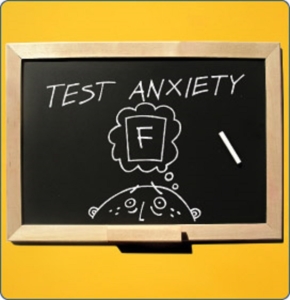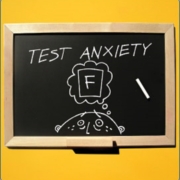Test Anxiety? 7 Tips to Prepare and Pass – Episode 446
 According to the American Test Anxiety Association, 38 percent of students have high or moderately high test anxiety. Test anxiety is where the test taker feels severe distress before, during and after the test. Test anxiety can not only interfere with information recall but may also cause some people to give up taking the text entirely or to keep putting it off, even though their career success depends on it. In this episode, Ted discusses test anxiety and offers 7 valuable tips for preparing for tests and taking tests while remaining calm, in control and able to recall the information needed to pass. It’s test time, so if you know someone who can benefit from listening to this podcast, please pass this along to them.
According to the American Test Anxiety Association, 38 percent of students have high or moderately high test anxiety. Test anxiety is where the test taker feels severe distress before, during and after the test. Test anxiety can not only interfere with information recall but may also cause some people to give up taking the text entirely or to keep putting it off, even though their career success depends on it. In this episode, Ted discusses test anxiety and offers 7 valuable tips for preparing for tests and taking tests while remaining calm, in control and able to recall the information needed to pass. It’s test time, so if you know someone who can benefit from listening to this podcast, please pass this along to them.
We’re getting into the spring and summer months and for students of all ages that means it’s time to take tests. From 7 th grade final exams to the LSAT, many students will pass their tests, some will fail because they are not prepared, and some will fail, even though they’re prepared, because of test anxiety.
Test anxiety can show up as early as first and second grades as well as in high school and beyond.
Did you know there is actually an American Test Anxiety Association? According to the ATAA:
*Roughly 16–20 percent of students have high test anxiety.
*Another 18 percent have moderately high test anxiety.
*Test anxiety is the most common academic impairment in grade school, high school, and college.
What is test anxiety?
Test anxiety is “the set of phenomenological, physiological, and behavioral responses that accompany concern about possible negative consequences or failure on an exam or similar evaluative situation.” That is from a book titled “Test Anxiety: The state of the art” by Moshe Zeidner. Put another way, test anxiety is a combination of over-arousal, tension, worry, dread, fear of failure, and “catastrophizing” before or during test situations.
It is a psychological condition where the test taker feels severe distress before, during and after the test; one can get so nervous and anxious about doing well (or just passing), that performance on a test is negatively affected. If you have any experience as to how a college final can produce this type of anxiety, then imagine having test anxiety while taking the bar exam, or an exam for licensure, where the stakes are high and there has been a significant investment in both money and time. It’s normal to have some type of nervousness about taking a test and in fact, this nervousness can be helpful by getting us into a state where we are pumped up to do well. But when this nervousness escalates into test anxiety, however, it can not only interfere with recall of information but may create a reaction so intense that it causes some people to give up taking the exam entirely, or to continue to put it off until
“someday”.
It’s important to understand that test anxiety is a form of performance anxiety.
Performance anxiety is where someone is extremely nervous about having to produce a result in a limited time or in front of people who are judging them. Test anxiety, stage fright, fear of public speaking and “choking” in sports performance fall into this category.
Symptoms of performance anxiety are like most other forms of anxiety reactions: rapid heartbeat, sweaty palms, shortness of breath, shakiness, confusion, or other physical aches or pains such as nausea or a stomachache. Like in the kind of stomachache your kid starts getting around final exam time. In my work as a hypnotherapist with people who are challenged by test anxiety, I notice that many of these people share similar characteristics, such as being prone to high stress, having perfectionist tendencies, or worrying a lot. The good news is that most instances of test anxiety can be dealt with in just a few hypnotherapy sessions, but here are some suggestions you can use right away to help you with deal with text anxiety.
Here are 7 tips to prepare and pass:
1. Diet can affect your ability to think and recall information. If you are skipping meals or eating meals or snacks high in carbs while studying for an exam, then you may be experiencing episodes of low blood sugar (blood glucose). Low blood sugar can trigger anxiety. Since the organ that uses the most glucose is the brain, a balanced diet can be helpful in creating optimal brain power. Have healthy snacks while you study and don’t skip meals.
2. Sleep seems to go by the wayside when students are preparing for exams. Plan your study or help your child plan their study time for when you feel the most alert, which for most people is not usually late at night. But if that works for you, then make sure you’re getting the amount of sleep that’s right for you. It’s probably more than you think: 8 hours for adults and even more for children. It makes sense to be well rested in the days leading up to a major exam, wouldn’t you agree? Being sleep deprived can trigger anxiety. I understand that at crunch time, if you’re an adult studying for the NCLEX and you have a family and a job, that you might need to burn the midnight oil. But get the sleep that you can.
3. Schedule your study. Not knowing when, where or how you can study can cause test anxiety. Last minute cramming can leave you feeling like you are not ready, also creating anxiety. Manage your time by organizing your schedule to give yourself the best conditions for learning. Decide ahead of time when, where, and for how long you will study. I suggest studying in periods of 50 minutes to one hour, with 10 to 15 minute breaks in between. Don’t sit in a chair for over an hour staring at a book, notes or videos, this can put you into a negative state of overwhelm which leads to a negative state of hypnosis. Overwhelm can be a real problem. Too much to do, too much to think about, and too much to handle, can be overwhelming. That’s why scheduling is a good thing to do. It enables you to chunk it down into bite size pieces. In other words, you would say to yourself: “I’m going to study from this time to this time, then I’m going to watch a little tv, then go to bed.”
4. Effective Preparation. Many people will only prepare for an exam by cramming the information into their heads. This is only half the equation; taking the test will involve recalling the information. Prepare for the exam by taking as many practice tests as you can as soon as you can. This will also clue you in as to what areas require more study. Remember the three Rs: Relax, Retain and Recall. The more relaxed you are, the more you will retain, and the more you will be able to recall. So, what would be ineffective preparation? Being tense and anxious while studying. Procrastinating. Putting it off. Worrying about failing. Doing these things is a recipe for test anxiety. Oh, and another thing: if you have to go to a testing center to take the test, be sure that you know exactly how to get
there, where to park and where to go. It might even be worth taking a drive out there if possible so that you know what to expect. Make sure you prepare your materials the night before the exam. Don’t do anything the morning of except eat and go. If your drive to the testing center is a long way, say an hour or more, consider renting a cheap motel room near the testing center and spending the night there so that the next morning you just get up, eat and get to the testing center in a few minutes.
5. Watch your self-talk. Self-talk is your internal language or thoughts. For God’s sake, avoid scaring yourself with inner conversations like “I know I’m going to just blank out right in the middle of the test!” or “I just suck at taking tests!” or “I’m going to bomb this test!” This is not helpful. Give yourself encouragement and support. Use positive affirmations in the days and weeks leading up to the exam.
6. Mental visualization can be one of the most effective techniques you can use to mentally “rehearse” taking the test while feeling calm, relaxed and comfortable. Remember that your mind can’t distinguish between what is real and what is vividly imagined. The more you vividly imagine the outcome you want, the more likely your mind will help you get it. Take 3 to 5 minutes to sit with eyes closed before you study and imagine, visualize or see yourself walking out of the testing location feeling good about your performance. Imagine receiving the information that you have passed. Setting a goal of passing with a particular score increases the chances that you will. Take a 3×5 card or a piece of paper and write the score that you want to achieve. For instance, if you need to score a 70 to pass, aim for 79 or 81. Write on your card or piece of paper, “I am passing the bar exam on July 23 and 24th with a score of 79 or higher.” If the exam is pass or fail, say “Passing with a high score.”
7. Extreme self-care Get a massage or two in the days or weeks before the exam to release excess tension and stress. Get a good night’s sleep the night before the exam, and don’t even think about showing up without eating a good meal with protein. Daily walking or any type of exercise can also be a great stress reliever. Remember, anxiety comes from prolonged stress and tension. Find ways to release it. Relax, retain, recall For the most part, test anxiety is a learned response. With practice, you can unlearn test anxiety and learn a different reaction. Have faith in your brain and cultivate a strong and abiding belief that you can and will pass!
I work a lot with people who have exam anxiety so if you are thinking that hypnosis and high-performance coaching might be the key to more relaxation, easier preparation and a passing score on your exam or exams, then reach out for a complimentary consultation. We’ll talk about what’s going on, I’ll answer any questions you might have and if you are ready, we’ll schedule your first session and start making it better. To request your complimentary consultation, go to https://tedmoreno.com/contact. I’ll get back to you within 48 hours.
Want to catch up on previous episodes? Click Here >
Here is your Episode Quote:
“Recipe for success: Study while others are sleeping; work while others are loafing; prepare while others are playing, and dream while others are wishing.” – that’s by the motivation author William A. Ward
Thanks for reading this and good luck!
Ted




